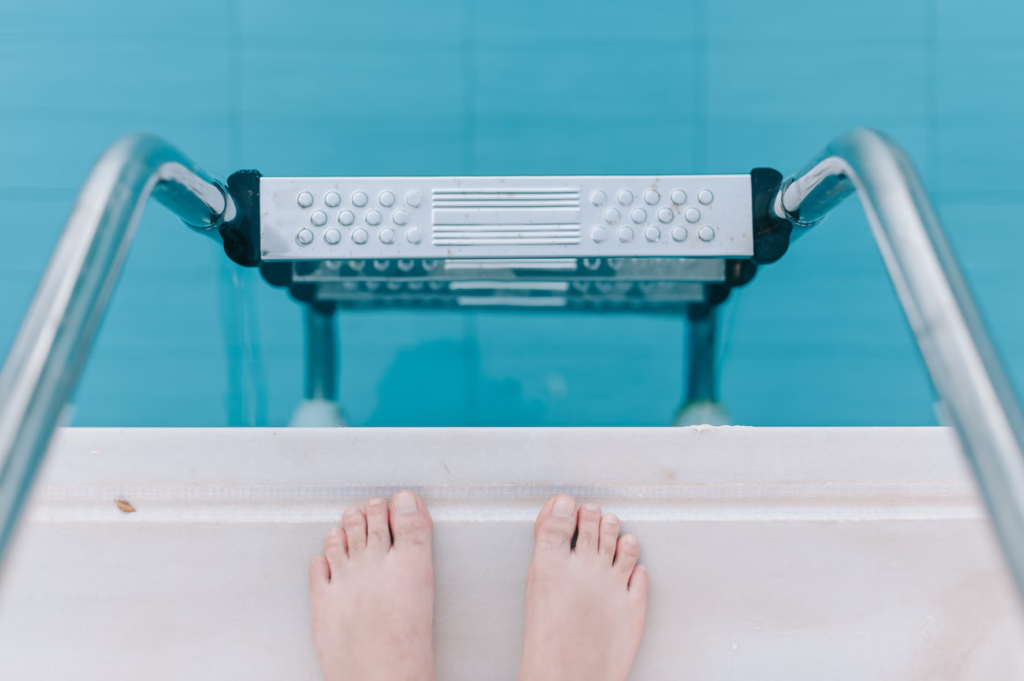All pool problems have a cause, and many like to blame it all on phosphates. Why? Almost every swimming pool contains them, so this is a common occurrence. Phosphates are not toxic or harmful on their own, but high levels of them lead to algae growth because they are “food” for them.
This is one of the most controversial topics regarding swimming pools. Some experts say that phosphates are terrible and should be gotten rid of immediately, while other specialists are less critical. In this article, we will try to deal with this subject and form an appropriate attitude toward phosphates in the pool once and for all.
What Are Phosphates And Their Role In The Pool?

In simple terms, phosphates are chemical compounds that contain phosphorus. They can enter your pool water from a variety of sources, including:
🔹 Cosmetics, lotions and shampoos
🔹 Mud
🔹 Leaves
🔹 Pool chemicals
For example, the city of Flint, Michigan is one of many in the United States with high levels of phosphorus in the water supply. This problem arises from garden fertilizer runoff and leaf rot in urban water bodies. So you may not even have a clue what’s causing the high levels of phosphates in the water sometimes, but the fact that they are there is not as bad as it sounds.
Phosphates act as a food source for beneficial bacteria [1], which help to break down organic matter and keep the water clean. They also help to prevent the growth of harmful bacteria, such as E. coli and Legionella.
So, while it’s vital to keep phosphate levels in check, it’s also important not to completely eliminate them from the pool. A small amount of phosphates can actually be beneficial for maintaining a healthy and clear pool.
Do Phosphates Eat Up Chlorine?
Phosphates in pool water can indirectly affect the effectiveness of . When these chemical compounds are present at high levels, they can act as a food source for algae and other microorganisms, leading to an overgrowth of these organisms. This overgrowth can consume chlorine, reducing its effectiveness and making it harder to maintain proper chlorine levels in the pool.
Additionally, algal blooms can make the pool cloudy and green, which is unsightly and unappealing. To avoid this, it is vital to keep phosphate levels low and test the water regularly to ensure the presence of appropriate levels of chlorine.

What Causes High Phosphates In Pools
High phosphates is a common issue in swimming pools and, if left unchecked, can lead to unsightly algae growth, cloudy water, and even damage to pool equipment. But what causes high phosphates? Here are a few main factors:
- Rainwater: it can carry phosphates from the surrounding environment into the pool. This can be a particular problem for pools located near agricultural areas or near lawns and gardens that use fertilizers that contain phosphates.
- Swimmers: phosphates can be brought into the pool on the skin and clothing of swimmers, as well as in hair and body wash. This is why it’s important to remind your guests to shower before entering the pool (and do it yourself, too).
- Fertilizers: phosphates can also enter the pool through fertilizers used on nearby lawns or landscaping.
- Organic matter: phosphates can build up in the pool as a result of decomposing organic matter, such as leaves or other debris, that gets into the water.
- Poor water circulation: if the pool’s circulation system is not working properly, it will not be able to filter out the phosphates from the water.
- Old filters: using old filter cartridges that are not able to filter the phosphates efficiently can also cause high levels of phosphates.
It’s important to regularly test the water to ensure that the phosphates level is within the recommended range. If it’s not, you can use specific products to lower the phosphate numbers and maintain the appropriate level.
By identifying and addressing the sources of phosphates in your pool, you can effectively combat high levels and keep your pool clean, clear and healthy.

What Will High Phosphates Do To A Pool?
We don’t want to scare you with all sorts of frightening possibilities, because phosphates are far from the biggest problem of swimming pools (usually). As a rule, you will not encounter too high levels of this chemical, and therefore all the possible consequences. But we owe you a warning about what can happen if you don’t keep an eye on the water chemistry and allow such a situation to occur:
- Phosphates act as a food source for algae and other microorganisms, leading to an overgrowth of these organisms. This can make the pool cloudy and green, and can also lead to increased maintenance and chemical use, which can be costly and time-consuming.
- As mentioned above, the overgrowth of algae and other organisms can consume chlorine, reducing its effectiveness and making it harder to maintain proper levels.
- High phosphates can also lead to staining and scaling on pool surfaces, such as tiles and liners.
- High phosphates can make the water in the pool cloudy, which can be unsightly and unappealing.
If phosphate levels are too high, there are specific products to lower phosphates and maintain appropriate levels.
How To Test Phosphates In A Pool

The best option for monitoring phosphate levels in your pool is regular water tests. You can do them yourself or with the help of professionals. What is the difference?
Let’s start with water test kits. This is the easiest and most affordable method, but the strips do not always give accurate results. Besides, not all pool water test kits include a phosphate level test, so you may have to take longer to find the right product.
By the way, there are two options for kits — strips or reagents. The reagents are more troublesome, but they are also more accurate.
Professional testing is the most expensive, but the most accurate. To do this, you will need to take a pool water sample to a pool store for testing. However, it is recommended to do this only in neglected situations, when you can no longer cope with the problem yourself. You may be hesitant to contact specialists to check your water, but sometimes it is worth it.
How To Reduce Phosphates In The Pool, And Do You Need To?
This is the part where various “experts” usually recommend a bunch of different chemicals that will supposedly save you from high phosphates. That’s not our approach — we’re against waste and unnecessary chemicals. So what do we suggest?
- We do not recommend adding unnecessary chemicals to the pool water. We advise you to always first check if you need to remove phosphates from the pool. If the phosphate level exceeds 1000 mg/m3 (1000 ppb or 1 mg/L), then you should consider purchasing a phosphate remover.
- Always maintain the correct chlorine level and shock-chlorinate if necessary.
Remember, only proper disinfection, circulation and filtration will help make your pool water clean and clear.

Can I Prevent High Phosphates In A Pool?
It’s always better to prevent a problem than to fix it. How do you keep your pool’s phosphate levels low? A few simple recommendations for you:
- Remove all organic debris (such as leaves) from the pool as soon as you see it.
- If possible, wash/rinse yourself before jumping into the pool. It’s best to set up a small shower near it, but it’s not necessary.
- Clean your filters on time.
- Check the composition of the chemicals you are using. We recommend that you use the ones designed for swimming pools since some of the regular chemicals (like scale-repellant) contain phosphates.
Summary
Phosphates are a common issue in swimming pools, as they can lead to an overgrowth of algae and other unwanted organisms. These naturally occurring compounds can enter a pool through a variety of sources, such as rainwater, fertilizers, and even swimmers themselves. High phosphates in a pool can cause several issues, including algae growth, chlorine consumption, staining and scaling, cloudy water, and increased chemical use.
To maintain a healthy and clear pool, it is important to keep phosphate levels low and test the water regularly. If phosphate levels are too high, there are specific products that can be used to lower them and maintain appropriate levels.
FAQ
✔️ How do I get rid of phosphates in my pool?
If the phosphate level exceeds 1000 mg/m3 (1000 ppb or 1 mg/L), then you should consider purchasing a phosphate remover.
❗ What will high phosphates do to a pool?
High phosphates in a pool can cause a few issues, including algae growth, chlorine consumption, staining and scaling, cloudy water, and increased chemical use.
📉 How do I lower phosphates in my pool naturally?
To lower phosphates in a pool naturally, you can try circulating pool water through a phosphate-removing filter medium or using natural enzyme products to break down organic matter. If it doesn’t work, switch to using natural clarifiers to coagulate and filter out the phosphates.
🤔 Do phosphates eat up chlorine?
Phosphates in pool water can indirectly affect the effectiveness of chlorine. However, when phosphates are present in high levels, they can act as a food source for algae and other microorganisms, leading to an overgrowth of these organisms.
Sources
1. Zheng Lei, Ren Mengli, Xie En, Ding Aizhong, Liu Yan, Deng Songqiang, Zhang Dayi. Roles of Phosphorus Sources in Microbial Community Assembly for the Removal of Organic Matters and Ammonia in Activated Sludge. Frontiers in Microbiology 10, 2019, doi: 10.3389 / fmicb.2019.01023/1664-302X


